
OMG !! Alkali Metals in water produce flames?
Yes…
Alkali metals are so reactive that they even produce flames or even explode when they come in contact with water.
But hold on…
A simple question is;
Why do alkali metals react with water?
Well, there are many reasons behind the reactivity of alkali metals, like;
- Large atomic size
- One valence electron
- Less ionization energy
- Lower boiling point
- Lower melting point
- Less density
- Weak metallic bonds
Let us discuss them below.
Why are Alkali metals so reactive with water? (Reasons)
Let’s see the reasons behind the reactivity of alkali metals one by one.
#1 Large atomic size
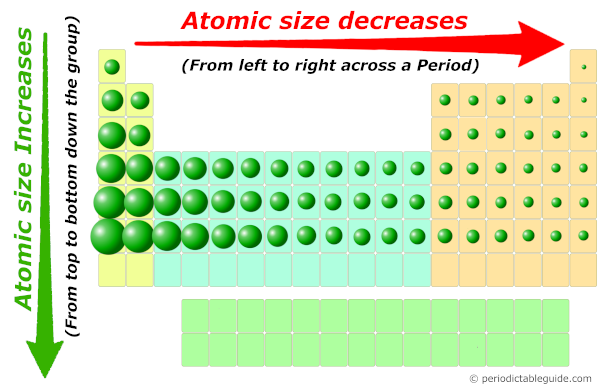
Just look at the above image, Alkali Metals (group 1 elements) have the largest atomic size as compared to the other group elements.
Now, as they have the larger atomic size, the attractive force between the nucleus and outermost electron will be very less.
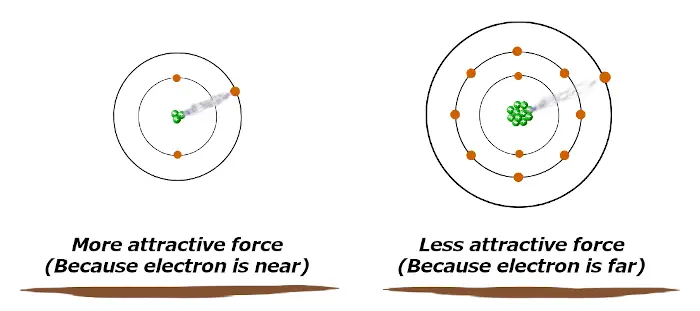
Above image indicates that if the atomic size is large, then it will have less attractive force. And if the atomic size is less, then it will have more attractive force.
And here, the alkali metals have larger atomic size. So they have less attractive force and because of this, they can lose electrons very easily during a chemical reaction.
Thus, due to the property of instantly losing the electrons, they react very fast with any element.
Hence, bigger atomic size of alkali metals leads to higher reactivity.
Also read: Atomic size trend in periodic table.
#2 One valence electron
Alkali metals are present in the first group of Periodic table.
Now you might be knowing that the elements lying in the first group have only one electron in their outermost orbit.
(If you do not know, what group number and period number indicates for an element, then read the simple and plain english explanation from here)
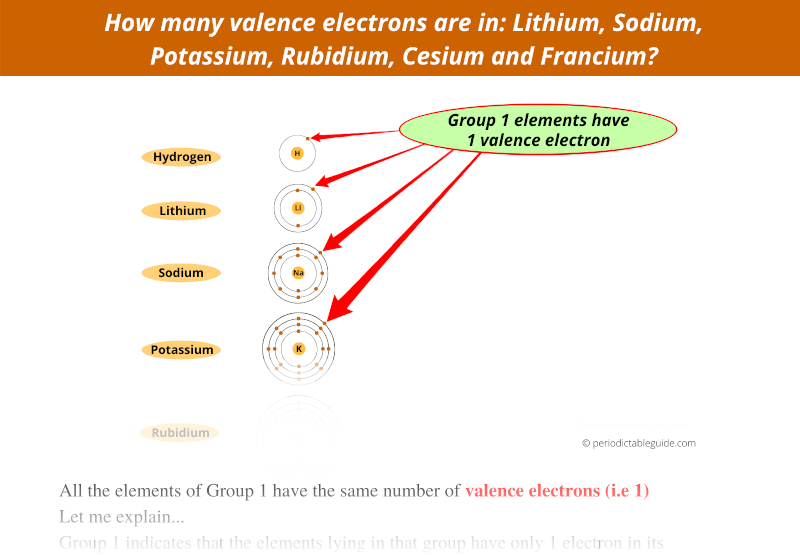
Now, as the alkali metals have only one electron in their outermost orbit, it is very easy to lose or donate this electron during a chemical reaction.
And as it is easy to donate the electron, the chemical reaction is very easy and this makes alkali metals more reactive.
Also read: Valency trend in periodic table.
#3 Less ionization energy
Ionization energy is the minimum energy required to remove an electron from the gaseous atom or ion.
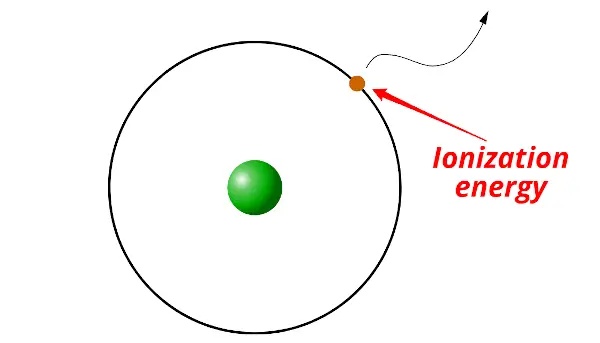
Now, as the atomic size of alkali metals is larger, it is easy to remove the electrons from their orbits.
In other words, ionization energy is very less for the elements located on the left side of the Periodic table. And as we move from left to right, the ionization energy increases.
Thus less ionization energy indicates that the atoms show a high tendency to lose electrons. So chemical reactions take place very fast and thus they are more reactive.
Also read: Ionization energy trend in periodic table.
#4 Lower boiling and melting point | Less density | Weak metallic bonds
You know that the alkali metals are solids.
But they are soft and they can be cut using a kitchen knife.
Alkali metals have lower boiling point & melting point.
The force of attraction between the molecules of alkali metals is very less, and because of this, they have less density.
Thus, due to less intermolecular force and weak metallic bonds, they have more tendency to react with other elements. Hence they are more reactive.
Reaction of Alkali metals with water (Equations)
Alkali metals react with water to produce alkalis (or alkaline solution or strong base) and also liberates hydrogen gas.
Here are the chemical reactions of Alkali metals with water.
Lithium reaction with water
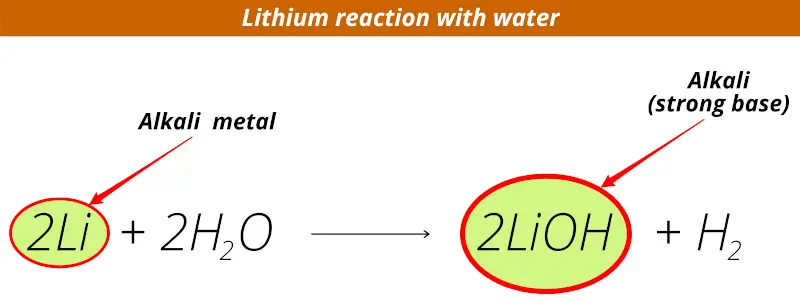
Lithium reacts with water and forms Lithium hydroxide (LiOH) which is alkaline solution.
Sodium reaction with water
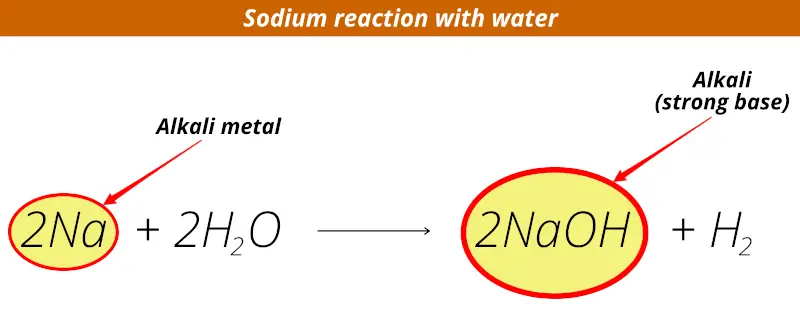
Sodium reacts with water and forms sodium hydroxide (NaOH) which is alkaline solution.
Potassium reaction with water
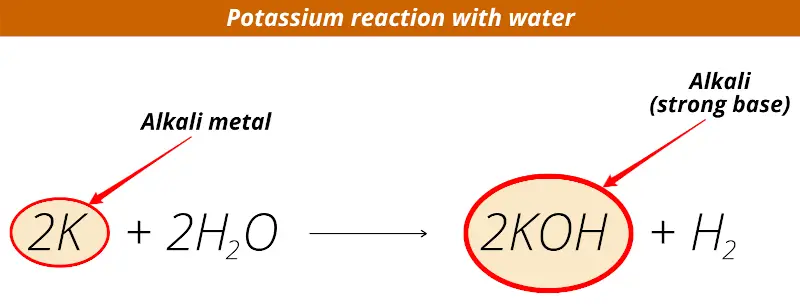
Potassium reacts with water and forms potassium hydroxide (KOH) which is alkaline solution.
Rubidium reaction with water
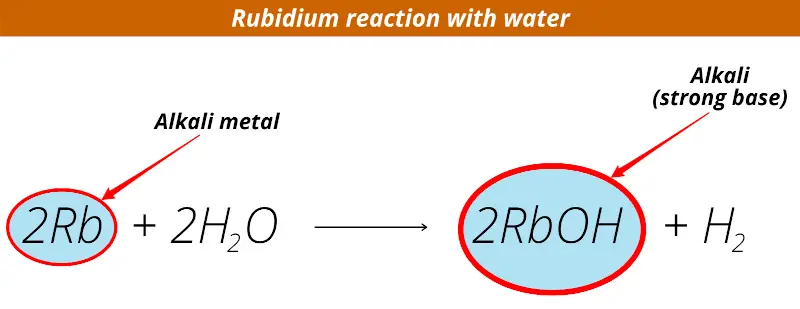
Rubidium reacts with water and forms rubidium hydroxide (RbOH) which is alkaline solution.
Cesium reaction with water
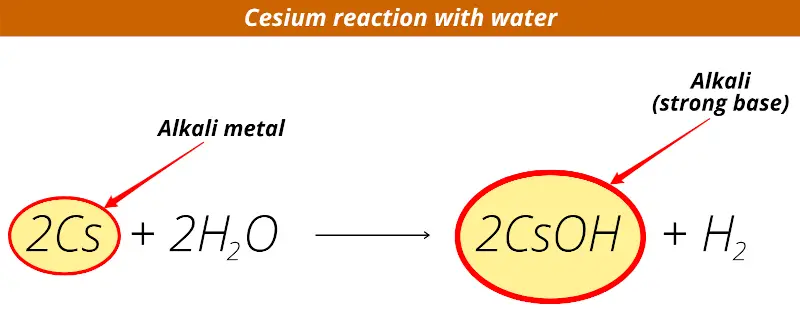
Cesium reacts with water and forms cesium hydroxide (CsOH) which is alkaline solution.
Francium is a laboratory made radioactive element and the same reaction is predicted to occur with Francium (Fr) also.
Hence from the above reactions we have seen that, when the alkali metals react with water, they form an alkaline solution and liberate hydrogen gas (H2).
I hope you have got the clear idea about the reactivity of alkali metals with water.
If you have any doubts, feel free to ask me in the comments below.
Explore our New Interactive Periodic Table (with Rotating Bohr Models and More)
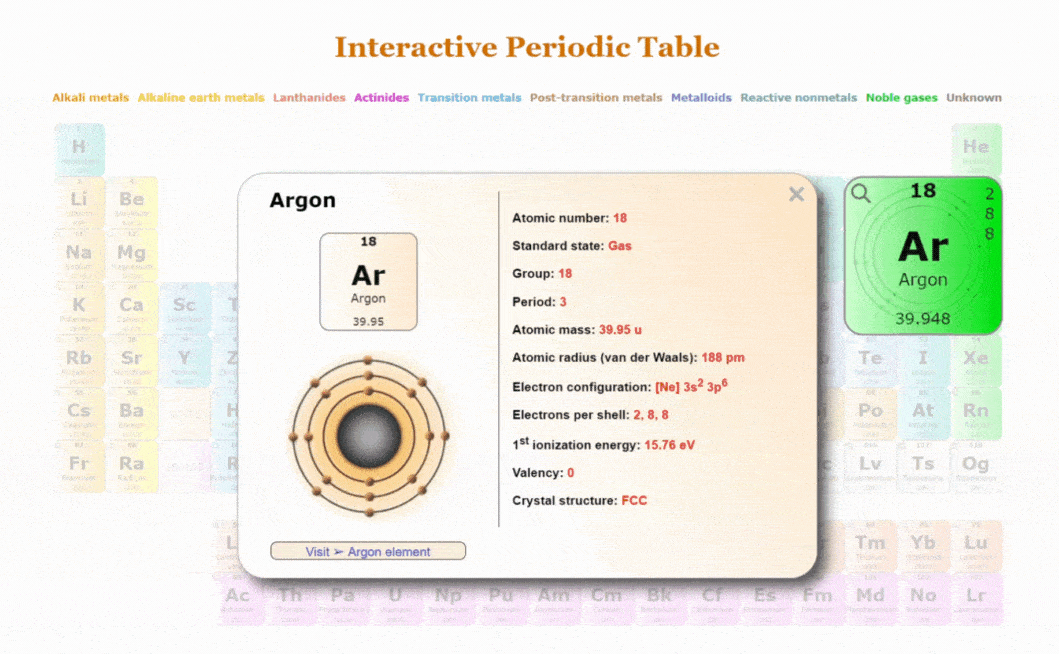
Details about this Periodic table:
- Access detailed info on all elements: atomic mass, electron configurations, charges, and more.
- View rotating Bohr models for all 118 elements.
- Get a free HD image of the Periodic Table.
Note: For future use, bookmark this Periodic table or visit “PeriodicTableGuide.com”
Suggested Important articles for you:
- Periodic table of elements (Detailed guide + HD image)
- Periodic table with metals
- Periodic table with nonmetals
- Periodic table with metalloids
- Periodic table with halogens
- Periodic table with noble gases
- Periodic table showing alkali metals
- Periodic table showing alkaline earth metals
- Periodic table with transition metals
- Periodic table with inner transition metals
- Periodic trends (Trends in periodic table)
